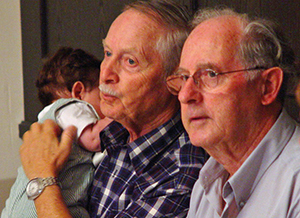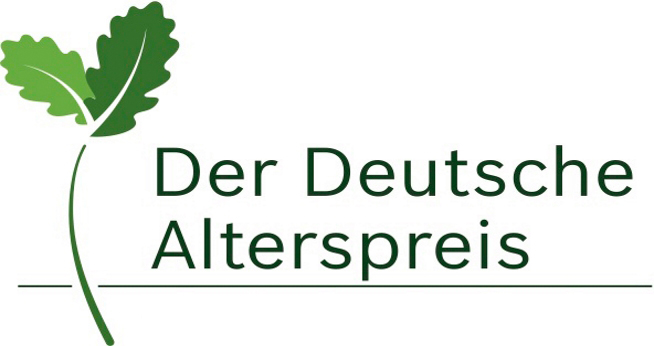Events
3. Film festival for Generations in Delhi, Mumbai, & Pune 2020
The 3. Filmfestival for Generations was planned for Msarch 2020 in Delhi, Mumbai and Pune. Cause of the pandemie Covid 19 it must be cancelled. Actually we´re hoping to start the filmfestival end of 2020.
2. Film festival for Generations in New Delhi (2019)
The 2nd Film Festival for Generations took place in New Delhi from 29th to 30th September 2019 in context of the DAAD- cooperation project "New Directions in 'Active Aging' and 'Age-friendly Culture' in India and Germany" (Heidelberg University and Jawaharlal Nehru University). As continuation of the 1st Film Festival for Generations, which was launched in New Delhi in 2018, a number of films with particular focus on age and ageing have been introduced followed by discussions on the topic with experts of the respective field. The festival‘s concept is based on the European Film Festival for Generations, which was held for the tenth time in October 2019 in more than hundred communities all over Germany and is being organized at the Institute of Gerontology (HU). Aim of the festival is to transfer images of active ageing and age-friendly culture and to build a bridge between academic research and the general public to discuss age-related topics.
The official opening of the festival at the India Habitat Centre was inaugurated by Phillip von Ritter (German Embassy New Delhi) speaking on ageing and demographic change in India and by Dr Martin Gieselmann (HU) and Suboor Bakht (HU) delineating the festival’s concept and aims such as to foster the intergenerational dialogue, to disseminate images of active and healthy ageing, and to increase knowledge and awareness amongst those directly or indirectly involved with the respective topics. Opening film was the American documentary “Alive Inside“ (2014) by filmmaker Michael Rossato-Bennett, who observed the astonishing experiences how individuals with dementia have been revitalized through the simple experience of listening to music. Second film screening was the Hindi drama “Rui ka Bojh - the weight of cotton” based on the novel “Gawah Ghair Hazir”. Playing in rural North India the film shows how the relationship between a father, suffering from age-related health problems, and his son deteriorates increasingly as the father settles down with his son. Both film screenings evoked interesting discussions on age-related topics between the audience and the discussants Dr Martin Gieselmann (HU) and Prof. Dr Shohini Ghosh (Jamia Millia Islamia University).
The interactive workshop “Fifty ways to organize an Intergenerational Film Festival” led by Matthias Roos (Public Health Authority Frankfurt am Main) took place at the India International Centre at the Film Festival’s second day. Persons from different professional fields and academic backgrounds discussed and collected together ideas and experiences for the creation of an own intergenerational film festival for older and younger audiences in New Delhi or in other parts of India. The brainstorming and round table discussion was followed and concluded by a networking lunch amongst the participants.
In the afternoon the documentary “Alive Inside” on dementia and music was screened at the Kamala Nehru College (University of Delhi) and was visited by a large number of students, project members and Matthias Roos, who provided the question and answer session after the film screening. The closing event of the Film Festival was hosted in cooperation with Samvedna Senior Care Foundation at their senior care centre in Gurugram. Members, staff and DAAD-project participants watched the German production “Sputnik Moment – 30 years gained“, which shows how senior citizens in Germany and the US were taking up second careers to fill their time and to improve their financial situation through an additional income. Filmmaker Barbara Wackernagel-Jacobs questions in her documentary hereby stereotypes of age and ageing by arguing for a new positive narrative for the process of ageing. The post-screening debate with focus on the Indian scenario was moderated by Archana Sharma (founder and managing director of Samvedna).
Overall the 2nd Film Festival for Generations New Delhi attracted a large number of visitors and offered a comprehensive opportunity for a fruitful exchange on age and ageing in India. The 3rd Film Festival for Generations in New Delhi and an extension to other locations in India is planned for April 2020.
WORKSHOP: FIFTY WAYS TO ORGANIZE AN INTERGENERATIONAL FILM FESTIVAL
30th, September 2019, 11:00 am - 01:00 pm, Committee Room III, Kamaladevi ComplexIndia International Cenre New Delhi
Head: Matthias Roos, Public Health Authority, Frankfurt am Main
Cinema and film can bring all generations together – in many different ways and in many kinds of venues. Choosing a film that older and younger people can relate to, offering tea and coffee before the screening, and finding an expert, who can provide a question and answer session after the film, seems like a very promising start. But what about programme flyers, fundraising, advertising, involving stakeholders, service providers and volunteers?
An approach to follow might be the example of the founders of the European Film Festival for Generations. They sat over a cup of tea in the staff room of the Public Health Authority in Frankfurt, Germany, pondering how active ageing, intergenerational dialogue, social inclusion and scientific research could be combined. Six months later their first festival edition was officially opened in cinemas in Frankfurt and Heidelberg simultaneously. Or, even better, you create your own personal way to organize an intergenerational film festival. In this interactive workshop we will collect ideas, exchange experiences and hopefully motivate each other to make the festival idea grow and establish a sustainable and attractive event for older and younger audiences in New Delhi and other parts of India.
1. Film festival for Generations in Mumbai (2019)
The Film Festival for Generations took place in Mumbai, India from 04th to 05th October 2019 as part of the DAAD- cooperation project "New Directions in 'Active Aging' and 'Age-friendly Culture' in India and Germany" (Heidelberg University and Jawaharlal Nehru University). Following the example of the “European Film Festival for Generations“ and in line with the Film Festival for Generations New Delhi, which has been launched for the first time in India in 2018 and continued in 2019, fiction and documentary films on age-relevant topics have been introduced. Aim of the festival is to build a bridge between academic research and the general public to discuss age-related topics and to transfer images of active ageing and age-friendly culture.
The Goethe-Institut/Max Mueller Bhavan hosted the Film Festival for Generations and its opening was inaugurated by Mr Peter Kern (German Consulate Mumbai) welcoming the audience and speaking on ageing, population and demographic changes in India and Germany. In the following, Dr Martin Gieselmann (HU) presented the aims and activities of the project "New Directions in 'Active Aging' and 'Age-friendly Culture' in India and Germany" and Dr Pablo Holwitt (HU) outlined the Festivals objectives such a to open up the discourse on age and ageing to a broader audience, to sensitize it for future possibilities and actual limits of demographic change and active ageing, and to clarify and constrast culture-specific perspectives on age and ageing.
Opening film was the German production “Forget me not“ (2017) - a documentary on dementia by regisseur David Sieveking (2012) portraying the domestic care of his mother, who is suffering from Alzheimer’s. The interesting discussion after the screening was moderated by Dr Malte Sieveking, father of the regisseur and main protagonist, who enriched the question-answer session with personal aspects and statements on the film’s topic. The opening closed with a reception.
At the next day films from India and Germany were screened dealing with topics such as activity and creativity in old age, housing, and dementia and care. Biography therapy with music in old age was explored in the German Film “The song of life“ (2013) by director Irene Langmann and discussed by Hrishikesh Pawar (Centre of Contemporary Dance, Pune). Second film screening was the Hindi film “Rui ka Bojh - the weight of cotton” playing in rural North India. The family drama shows how the relationship between a father and his son worsens as the father settles down with his son and as the father’s health deteriorates increasingly. After the screening Prof. Dr. Nasreen Rustomfram (TATA Institute of Social Sciences, Mumbai) engaged with the audience in a lively discussion with the consent that the current situation of the Elderly living in rural India is not to different as the scenario shown in the film. The Film Festival closed with the Indian film “Astu-So be it” (2013) on family care and Alzheimer in presence of the main actor Dr Mohan Agashe, who moderated also the post-screening debate with focus on dementia in India. The Film Festival for Generations in Mumbai was very well attended by young and old alike and fostered not only the public discourse about ageing and demographic change in India but also the intergenerational dialogue. The next Film Festival for Generations in Mumbai will take place in April 2020.
1. Film festival for Generations in Delhi (2018)
The Film Festival for Generations has been launched for the first time in India, New Delhi from 24th to 26th September 2018 in frame of the DAAD-funded cooperation project "New Directions in 'Active Aging' and 'Age-friendly Culture' in India and Germany" (Heidelberg University and Jawaharlal Nehru University).
Based on the concept of the “European Film Festival for Generations“, the Festival introduced fiction and documentary films with a particular focus on age and ageing followed by discussions about the topic to build a bridge between academic research and the general public. The Film Festival‘s aim is to transfer images of active ageing and age-friendly culture, to promote the intergenerational dialogue and discourse, and to increase knowledge and awareness amongst those directly or indirectly involved with the respective fields, eg. doctors, social workers or policy makers. By screening a number of films from both India and Germany, the Film Festival also intended to clarify and contrast culture-specific perspectives on age and ageing.
The official opening of the festival at the India International Centre (IIC) was inaugurated by Prof. Dr. Andreas Kruse (Institute of Gerontology), Dr. Stephan Lanzinger (German Embassy), T.P. Madhukumar (The Ministry of Social Justice and Empowerment) and Venkatesh Srinivasan (United Nations Population Fund). Opening film was the German production “Forget me not“ - a documentary on dementia by regisseur David Sieveking (2012) portraying the domestic care of his mother, who is suffering from Alzheimer’s. The opening continued with a discussion moderated by Prof. Kruse and Mohan Agashe (Psychiatrist and Actor) followed by a reception. At the next two days German and Indian films were screened at the IIC dealing with topics such as activity and creativity in old age, housing, and dementia and care.
The Indian film “Astu - So be it“ (2013) by the directors Sumitra Bhave‘s and Sunil Sukthankar’s is about a Sanskrit scholar (Dr. Chakrapani Shastri) who suffers from Alzheimer’s disease being played by Mohan Agashe, who also chaired the following discussion. “Mukhti Bhawan“ (“Hotel Salvation“, 2016), an Indian production by the director Shubhashish Bhutiani, deals with a son who is forced to set his job aside to accompany his elderly father to the holy city of Varanasi, where his father believes he will breathe his last and attain salvation. Biography therapy with music in old age was explored in the German Film “The song of life“ (2013) by director Irene Langmann and discussed by students of Heidelberg University (SAI, HCTS, IOG). The Film Festival closed in presence of film producer Barbara Wackernagel-Jacobs with the screening of the documentary “Sputnik Moment – 30 years gained“, which questions stereotypes of age and argues for a new, positive narrative for the process of aging. Further screenings took place at a primary school in New Delhi (Springdales school), at Maitri College (Delhi University) and at JNU. The Film Festival was very well attended and stimulated and contributed to the public discourse about ageing and demographic change in India. The 2nd Filmfestival for Generations will take place in New Delhi in September 2019.
Symposium-Reihe zum Thema „Digitalisierung und Teilhabe“ (2018)
Im Rahmen des Netzwerks Regionalstrategie Demografischer Wandel und in Zusammenarbeit mit dem Europäischen Filmfestival der Generationen
10.04.2018: Das Thema „Teilhabe und Digitalisierung“ steht im Fokus des diesjährigen Europäischen Filmfestivals der Generationen. Im Rahmen des Netzwerks Regionalstrategie Demografischer Wandel findet in Zusammenarbeit mit dem Europäischen Filmfestival der Generationen eine Symposiums-Reihe zu diesem Thema in allen drei Landesteilen der Metropolregion Rhein-Neckar statt. Vor dem Hintergrund des demografischen Wandels und einer Alterung der Gesellschaft gilt es, die Sorge und Mitverantwortung in der Kommune durch „lebendige Nachbarschaften“ zu stärken. Teilhabe und Versorgung im Alter sollen durch kommunale und nachbarschaftliche Solidargemeinschaften ermöglicht und gefördert werden.
- Di, 12.04.2018, 14:00 - 17:30 Uhr, Eberbach, Rathaus: Programm
- Di., 17.05.2018, 14:00 - 17:30 Uhr, Speyer, Ratssaal: Programm
"menachem und fred" mit menachem mayer und den brüdern hopp zu gast (28-06.2017)
Sommerprogramm in Frankfurt am Main im Rahmen der bundesweiten Woche der Brüderlichkeit
30.06.2017: Als Sommerprogramm zeigte das Europäische Filmfestival der Generationen am 28. Juni 2017 (15 Uhr) „Menachem und Fred“ im Frankfurter CineStar Metropolis Kino. Durch die Zusammenarbeit mit dem Verein Jüdisches Leben Kraichgau und der bundesweiten Woche der Brüderlichkeit gelang es, sowohl Hauptdarsteller Menachem Mayer (eigens dafür aus Israel angereist) wie auch Rüdiger und Dietmar Hopp für einen Besuch zu gewinnen. Das von HR-Redakteurin Sylvia Kuck moderierte Filmgespräch beleuchtete persönliche und berührende Momente aus deren gemeinsamer Geschichte und zeigte so, dass Versöhnung und Freundschaft trotz einer schwierigen und scheinbar unüberbrückbaren Geschichte möglich sind. Eingeleitet wurde der Abend mit einem kurzen Vortrag über Gedenkstättenarbeit von Frau Ute Coulmann. Ein wirklich ganz besonderer Filmnachmittag, der allen Anwesenden sicher lange in Erinnerung bleibt.
- Programmheft (S.47): Woche der Brüderlichkeit - "Gehe hin und lerne"
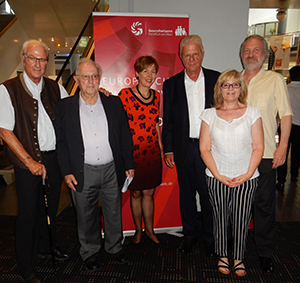 Dr. Menachem Mayer aus Jerusalem (2.v.l.) zusammen mit den Brüdern Rüdigeru nd Dietmar H, Referentin Ute Coulmann, Sylvia Kuck vom HR und Matthias Roos vom Gesundheitsamt Frankfurt und Co-Leiter des Eruop. Filmfestivals der Generationen
Dr. Menachem Mayer aus Jerusalem (2.v.l.) zusammen mit den Brüdern Rüdigeru nd Dietmar H, Referentin Ute Coulmann, Sylvia Kuck vom HR und Matthias Roos vom Gesundheitsamt Frankfurt und Co-Leiter des Eruop. Filmfestivals der Generationen
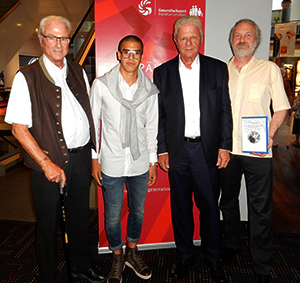 Die Brüder Hopp und Matthias Roos zusammen mit dem israelischen Fussballspieler der TSG Hoffenheim, Ilay Elmkies. Der U19-Spieler hat zusammen mit Menachem Mayer bei dem beindruckenden Kurzfilm "Zahor – Erinnerung" mitgewirkt.
Die Brüder Hopp und Matthias Roos zusammen mit dem israelischen Fussballspieler der TSG Hoffenheim, Ilay Elmkies. Der U19-Spieler hat zusammen mit Menachem Mayer bei dem beindruckenden Kurzfilm "Zahor – Erinnerung" mitgewirkt.
- Kurzfilm (2018, 18 Min., Regie: Wolfgang Els): Zahor - Erinnerung
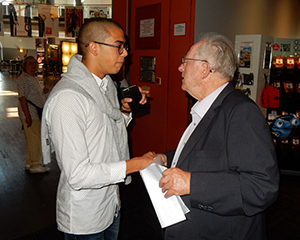 Ilay Elmkies und Menachem Mayer - Dialog der Generationen aus Israel/Hoffenheim
Ilay Elmkies und Menachem Mayer - Dialog der Generationen aus Israel/Hoffenheim
Menachem und Fred
Aufarbeitung und Aussöhnung einer jüdischen Familientragödie